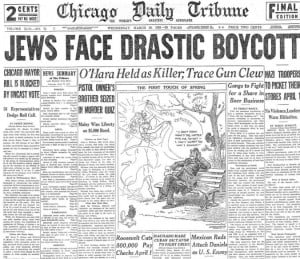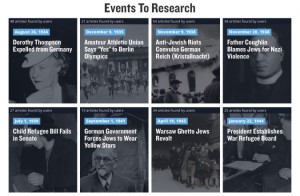In future history books, one of the notable features of the U.S. presidential election of 2016 will be the rise of white nationalism in the U.S., including the appointment of Steve Bannon – the person who claims to have created the most popular online platform for sharing white nationalist ideas – to a powerful senior position in the Trump White House. To help students understand these events, schools would do well to renew a commitment to teaching about modern history’s most influential white nationalist movement, the Nazis.
Nazi history is exceptionally important today because the party’s rise from a white nationalist, anti-Semitic, racist fringe group to a world-class military power that almost succeeded in imposing it’s genocidal dictatorship across the globe remains the primary foundation and inspiration for current white supremacists in Europe and the U.S. It’s not enough to teach that Nazi Germany existed and was our enemy in WWII; we have to help students identify the factors that gave rise to one of the most destructive ideologies in human history.
It is fortuitous, if coincidental, that the U.S. Holocaust Memorial Museum is engaged in a project that could help students examine the Nazi rise to power while also engaging in media literacy analysis. History Unfolded, a crowdsourcing project by the United States Holocaust Memorial Museum, is inviting the public to help crowdsource an answer to questions about what Americans knew about Nazi violence or intentions and when they knew it. Scholars have already examined coverage of events in major newspapers and newsreels, but no one has ever looked at what would have been seen by people who got their news from small town papers in the 1930s and 1940s. So the museum is asking the public to comb through libraries to find local newspaper articles, political cartoons, and letters to the editors. The results will be uploaded to a searchable database and some may be included in the Museum’s 2018 exhibit on America’s response to the Holocaust.
Several educat ors and historians involved in the project have pointed out that, in addition to the benefit of students doing real-world investigation, the project provides ample opportunity for students to learn about their own community.
ors and historians involved in the project have pointed out that, in addition to the benefit of students doing real-world investigation, the project provides ample opportunity for students to learn about their own community.
- What did people in your community know about the event?
- What do the newspapers tell us about how local and national leaders and community members reacted to news about the event?
- What did you learn about the relationship between the rise of the Nazis and what was going on in your community?
- What did you learn about the Nazis or WWII that might be relevant to understanding current events?
There are also a wide range of natural media literacy analysis questions:
- Where does the story appear (what page) and how much column space was devoted to the topic? What do these factors tell you about the story’s importance to your community?
- What were the sources of information? Was the reporter on scene or conveying information shared by others?
- What questions did the reporter ask? What questions might they have asked that they didn’t?
- Was the information accurate? If not, what do you think accounts for the errors?
- How was the story framed? What was the primary message? Did the piece rely on or include any stereotypes?
- What role did AP or other newswire sources play? Did the local paper reprint a wire source or do it’s own reporting? Is there a local angle?
- How many news sources were widely available in your community in the 1930s? How did coverage of the Nazis in the source you are looking at compare to other local sources? How did it compare to major national sources?
And though it’s not the focus of the project, it would be easy to spend just a little bit of class time contemplating how the media literacy lessons might be applied to modern media:
- What role do wire services play today?
- Newspaper editors determined which stories made the front page. Who determines what shows up in the news feeds on Facebook or other social media platforms?
- How do reporters today gather information? How does the widespread availability of Internet or wifi enabled phones with cameras change the nature or credibility of journalism?
- How does news coverage influence the way we think about groups of people with whom we may not have much personal contact? How does the existence of “comments” sections at the end of news stories, or links to Twitter threads influence our ideas?
- How does news coverage influence a nation’s willingness to go to war?

